We saw how forever chemicals are invading our water systems… And got a sobering view of the dwindling state of six of the planet's major rivers and lakes — from outer space! But, the news was not all bad. Chief Engineer, Dan Early, showed us a parade of Modular Water and Progressive Water systems in production that totally solve those water purity concerns. And the Facebook Live show with Ivan Anz was LOADED with answers and then as a bonus we got a VERY exciting update from Water on Demand's general manager, Manuel Vianna! It's all here in the briefing video.
Transcript from recording
Opening
I'm Riggs Eckelberry co-founder, chairman, CEO of OriginClear. The government needs to continue to provide a lot of abundant clean water, but what happens to it after it's used when it's dirty? Do you know that 80% of all sewage is never treated, it's just dumped? That leads to water scarcity, but it also leads to a lot of disease and pollution, the ocean turning into something horrible. The same time, the cities and counties are not getting the funding they need to really treat the water and so they can't keep up.
The solution is let the people who use the water clean the water. Water on demand is investment in actual capital assets that earn income. Sign up to hear my weekly briefing every Thursday night. 5 p.m. Pacific, 8 p.m. eastern. Just put Oc.gold/ceo in your browser, register for the briefing and look forward to hearing more from you.
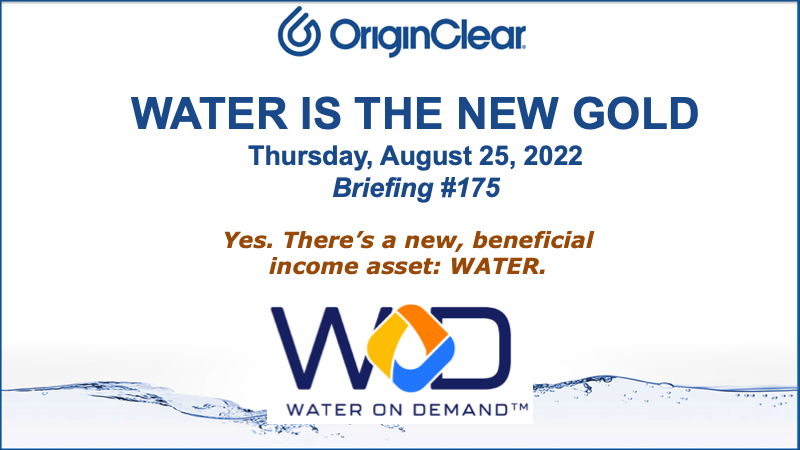
Introduction
And good evening, everyone. Another exciting SEO briefing. Action packed. I see a lot of people are arriving. Very happy to see you all. So I'm going to just keep right on truckin here. Wow. August 25th is the last briefing of August and then we'll be on. The next one is the first. And we are talking about the new beneficial income asset water, which is becoming increasingly recognized as something that is worth something that is no longer a government monopoly and that everyday investors through OriginClear can invest in.
News Items
Riggs: Super exciting. And we have lots of developments. I'm going to start by just showing you our latest article in Midwest Today. Here we go.
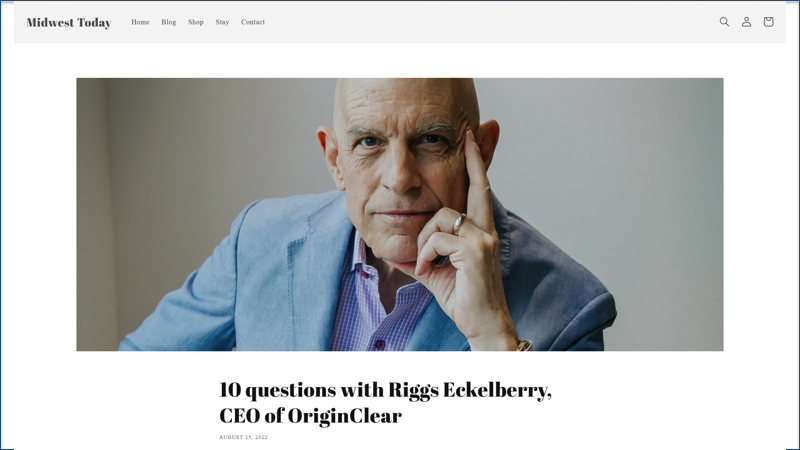
Ten questions. And this is kind of sneaky. We ask you questions about this and the other thing. And of course, we get to put our little agenda in there and enough of that gets out there. It sort of gets the word out.
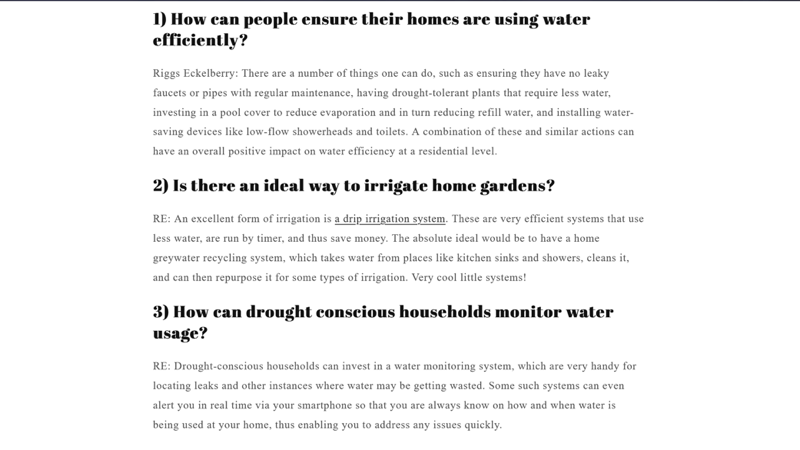
So how can homes use water efficiently? Can you irrigate home gardens? Drought conscious households. We have a wonderful writer, Tessa Maurer, who puts these together. And so it's. Yes, I actually did not write this, I have to say. However, we then slip into our own messaging.
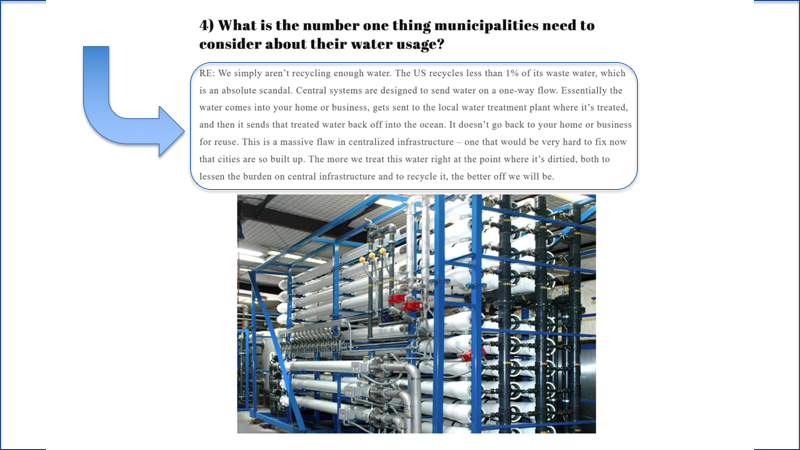
Right here that, as I always say, this central systems are not designed for recycling. You want to basically deal with the fact that we have to treat the water at the point where it's made dirty to lessen the burden on a central infrastructure and of course, recycle.
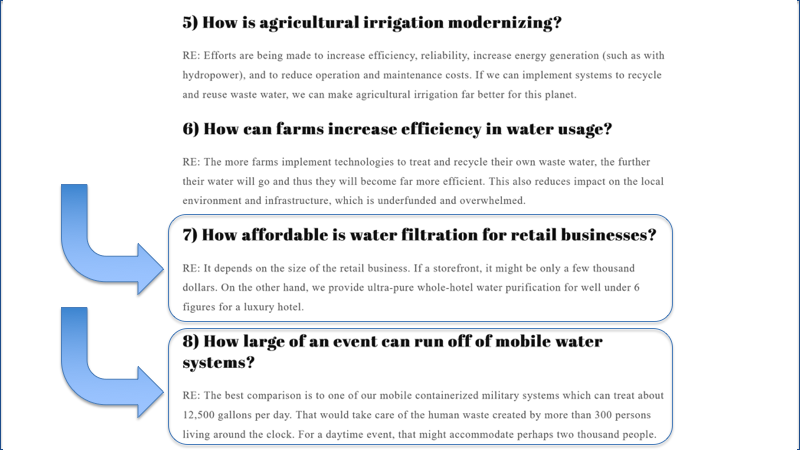
And again, more points about agricultural, irrigation, modernizing and so forth. And then we talk about water filtration, where talking about this upcoming major rollout of whole hotel water purification. And it's very exciting. Of course, it's taken forever. You've been hearing about it for the longest time. And in fact, we're even working on a second hotel in the same chain while the first one is not even publicly launched for us. But nonetheless, it's happening.
And what this particular chain is very, very focused on is the fact that these forever chemicals are becoming a big, big deal and they want to get ahead of it. And so this system ensures that everything in the hotel is free of these forever chemicals. It's not cheap, but it's a major point of differentiation for a luxury hotel.
And then they also want to know about can you run an event from mobile water systems? And of course, we can do that where we have containerized military systems. We're rolling some out right now and it's about 12,500 gallons per day where for an event you might have 2000 people. Fun fact. And it's the kind of stuff we're delivering.
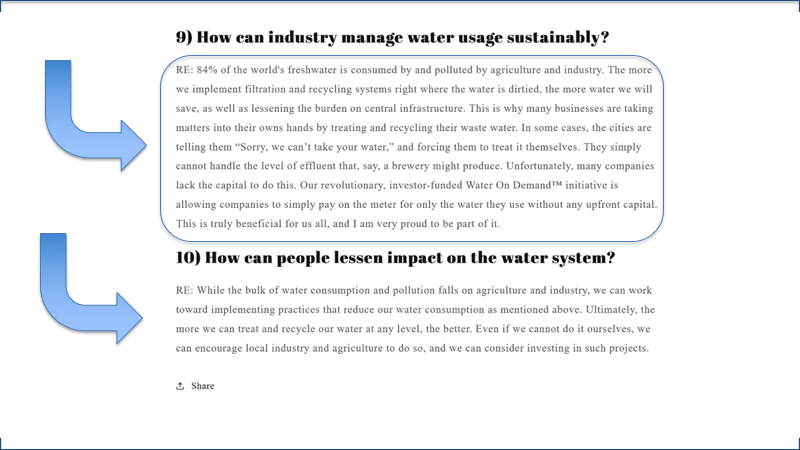
Okay. And then just to finish here, the fact about all this water shortage, the fact that agriculture and industry, primarily agriculture, use most of the water. It's not the poor people in LA that are the problem. It's the very water intensive crops in the Imperial Valley. And I'm not saying we're stuck with it, but that's the real problem.
But there is a way to handle it again through recycling and through treating it on the site at the point of use. So and of course, even if we kind of do it ourselves, we can encourage local industry agriculture to do so and we can consider investing in such projects.
End
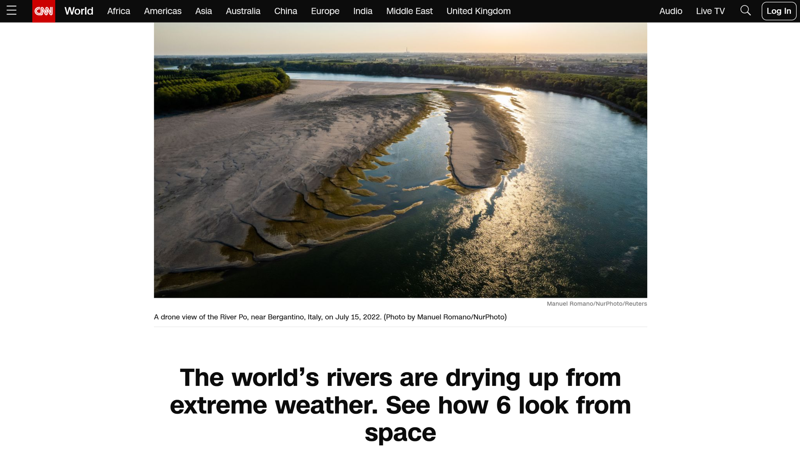
All right. Next piece of news is really interesting, it's shocking. I'm going to show you these rivers as they're seen from outer space. And I think it's going to blow your mind. So let's take a look here and we'll go right to the top here and you'll see.
Here's the Colorado River.
And this. We'll show you Lake Mead. Look at that. That's the current state. This is what it was in July 2000.
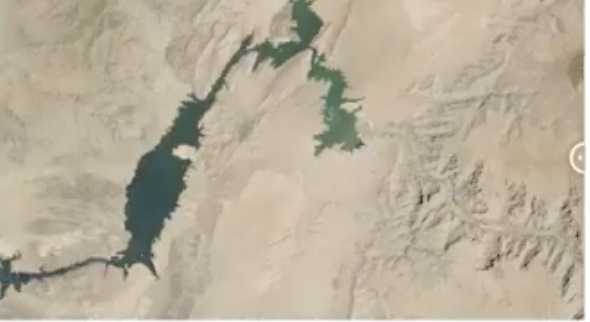
And here is how it is. It's pretty scary. It's pretty scary. Let's take a look here at. That was this is Lake Mead itself.
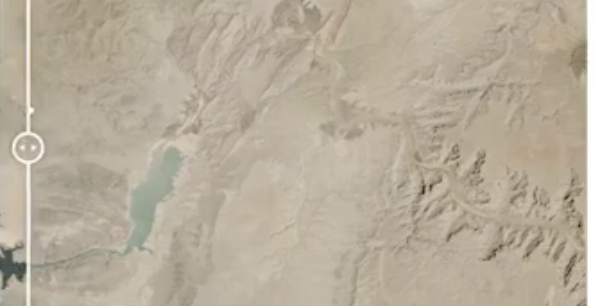
Let's take a look here again. Lake Mead shrinking right down and. We can see. At the very bottom here is the Hoover Dam.
Yangtze River
And then the Yangtze River, which is vastly important to China. Because they use hydropower for about 80% of electricity in the province of 84 million people. So that's huge. So this, again, shows you how it's dwindling. More sandbanks.
Rhine River
The Rhine River is in trouble. Now, the Rhine, basically, if they don't get if they get down to about 40 centimeters on the Rhine, they won't even bother shipping. Now they're at 32. So here's how it was. And here's how it is and use these sandbanks. And basically any level less than 75 centimetres means you have to reduce your load to about 30%. So that's a big deal because the Rhine is a major shipping thoroughfare.
River Po
Ok, River Po, which a tremendous amount of people depend upon, 30% of Italy's food is produced in this river. And once again, we see here, devastating dryness.
Loire River
The Loire in France at Saumur. Saumur is where the military school is located. Their West Point is called Somalia. And here we go. Now, the law always has sandbanks. You can tell it's not an incredibly navigable river, but it cools for nuclear power plants. And that's that's why it's critical.
The Danube
The Danube is actually Europe's longest river. It passes through ten countries and they have a problem. You can see here almost no sandbanks here, very, very shallow. And it's cut down tourism and Hungarian part, which is the shallowest, I guess, can only be navigated without cargo. What's the point of that? Right. So that gives you a sense of what's going on here. And I'm not going to get into why it's happening. These are, of course, the watersheds. The the upstream watersheds are very, very dry. But it's creating a problem.
End
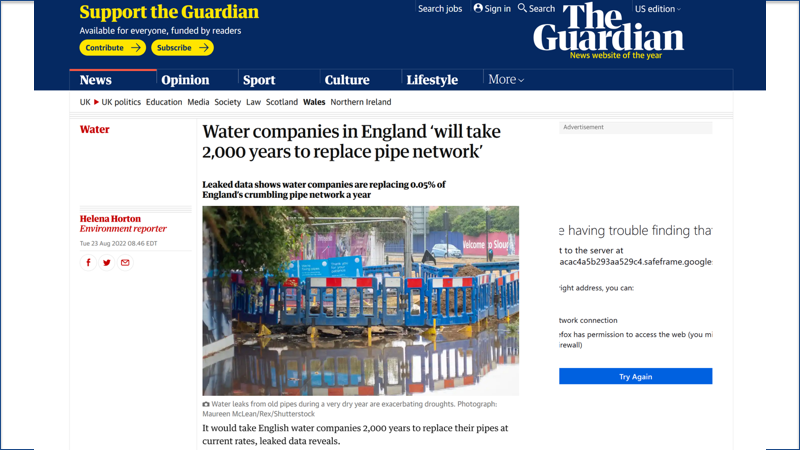
Right. I've been talking to you about how municipalities aren't keeping up with their water conveyance. You know, how water is being taken from one place to another. Water companies in England will take 2000 years to replace their pipe network. That's not just England, by the way.
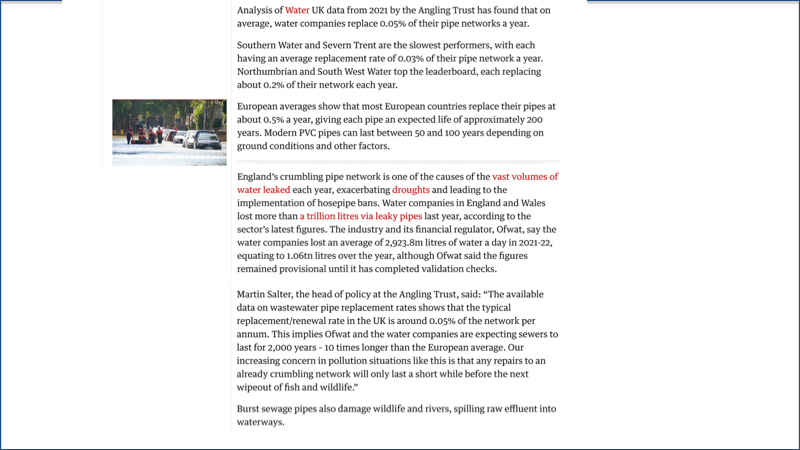
Most European countries replace their pipes at about 0.5% a year. And that is not enough. Enormous amounts of they're losing a trillion litres of water each year in England and Wales alone.
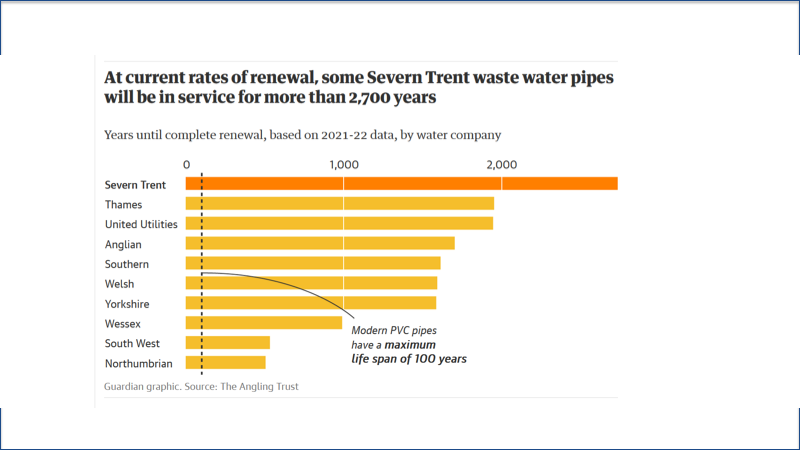
And we can see here that on the Severn here, it's something like 3000 years to replace the pipes. This is why we are seeing a growth in our pump station business, because those pump stations are part of the system. The pipes themselves are just they're just pipes. No big deal. But we build the vertical pump stations that connect them so that they can go up hills, basically. So that's we'll be talking more about how this is a growing business for us.
For now, the city is just as you can tell, just aren't keeping up. It's a huge amount of loss, water loss, typically up to 30% of water loss. And in the middle of droughts, it's pretty ridiculous, isn't it?
End
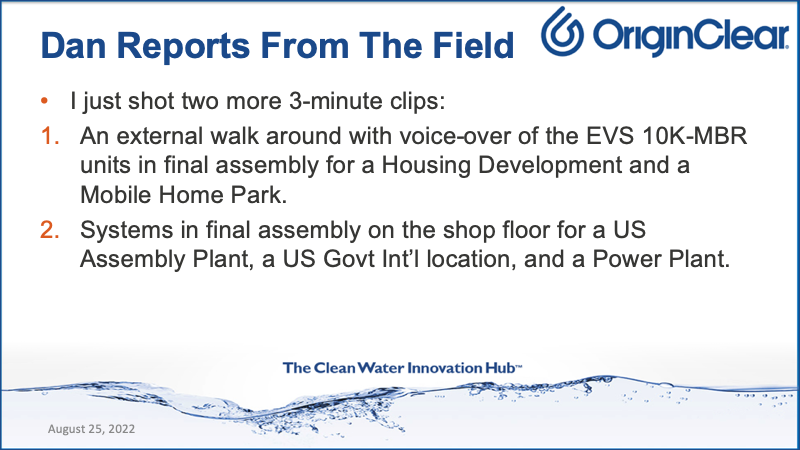
Okay. So I promised you some reports from Dan Early. He's got two clips. One is a walk around of the EveraSKID 10,000 gallon per day membrane bioreactor system, once for a housing development. And the other one is from mobile home park. The other one is for a US assembly plant. I'm not going to say what kind of assembly plant. It's very, very, very, very, very famous. It's also a US government international location. Those are embassies that we do. And finally, a power plant. Let's take a look, first of all, at the EveraSKID walk around that he did.
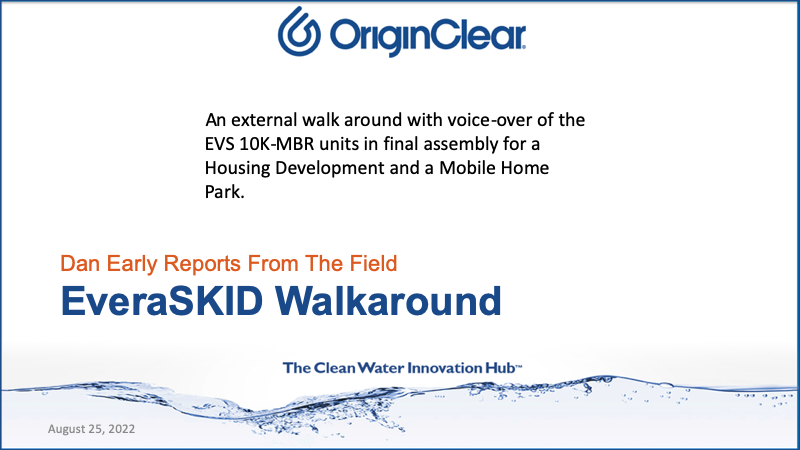
Start of video presentation
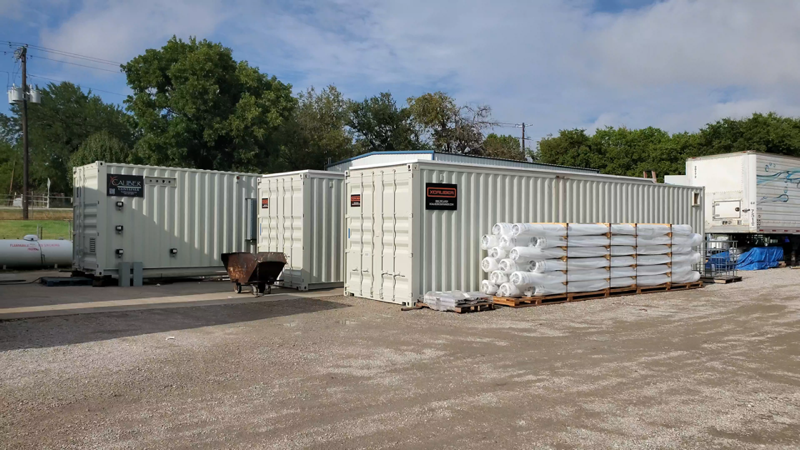
Dan: It's about 5:30 p.m. on Thursday, August. The 18th 2022. I am on the yard at Progressive Water Treatment in McKinney, Texas. Just want to give a quick walk around of current systems and production. You will notice that we have three container systems here on the yard. The first two containers are basically identical EveraSKID 10K MBR units.
Those are 10,000 gallons per day. Advanced BioReactor, Advanced Wastewater Treatment Units. These are plug and play wastewater treatment systems. They are in 40 foot high cube containers. With a structural plastic tank inside, compartmentalized by all the subunit processes. Now these are designed for delivery on a project site and you will drop them, plug in your input pipe, plug in your outlet discharge pipe, make a power connection in the units are ready for commissioning.
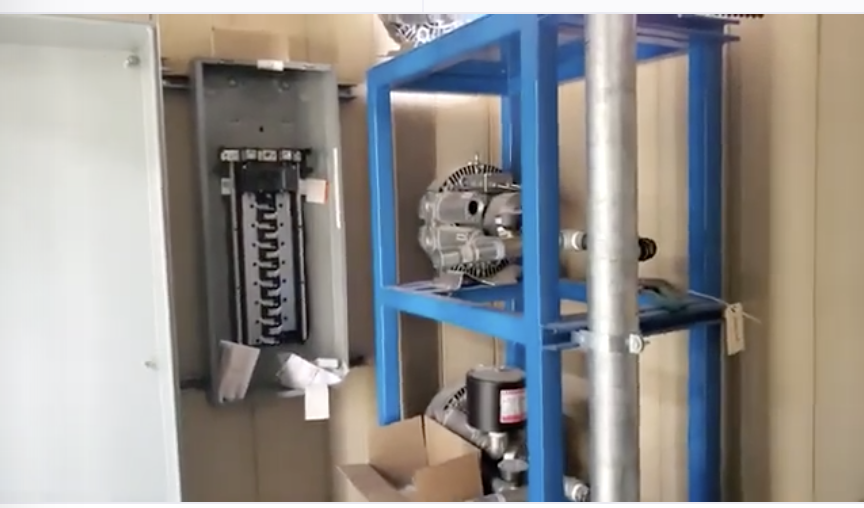
The unit here is, the here's the equipment room. This is integral to the EveraSKID system. This one is still in the latter stages of final assembly. But this is the typical equipment room that you would see that comes with the system, and this is why it is a plug and play solution. This gives us the ability, like I said, to connect the inlet pipe, connect the outlet pipe, connect the power connection, fill it up with water and hit the start button and it's ready to go.
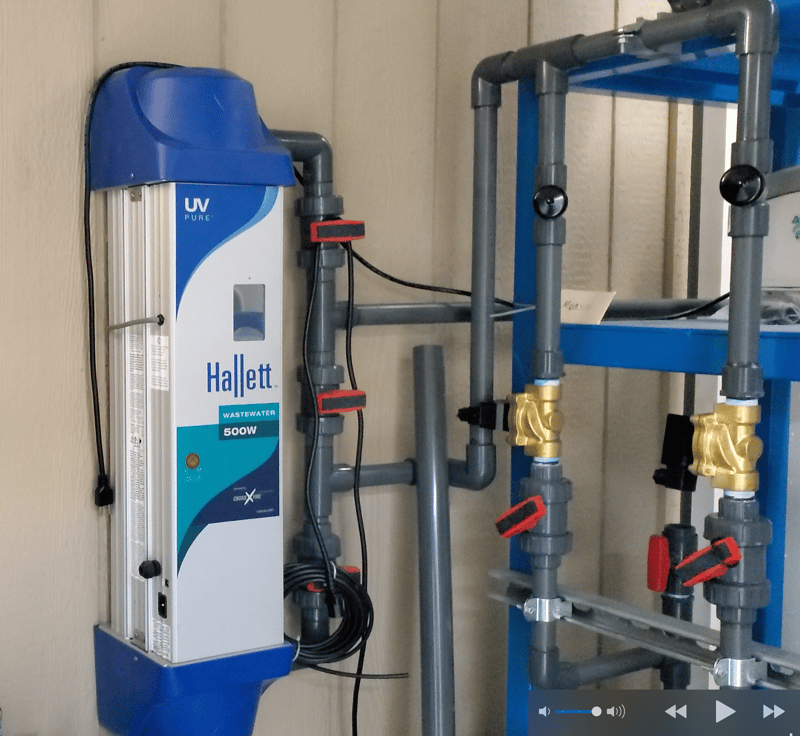
So it treats 10,000 gallons per day of domestic wastewater to a tertiary level, which that means you are less than ten mg per liter BOD, ten mg per liter TSS and with disinfection through that Hallet UV disinfection system, the treated water out of this is perfectly suitable for secondary re-use, such as site irrigation, landscape irrigation, landscape water feature replenishment, reflush, if you want to send it in purple piping and send it back into a facility.
So this gives you a sense of what the EveraSKID 10K MBR unit looks like. These are part of the the MBR product line, the EveraSKID product line. So we have treatment units in the 5000, 10,000, 15,000, 20,000, 25,000 gallons per day range.
End of video presentation
Wastewater Treatment Terms Defined
Riggs: And then here's the second one. This is systems of final assembly for that Progressive Water Treatment. Now, before we move on here, just to go back to this EveraSKID then was talking about tertiary levels of treatment at third level. The third point is where you remove the nitrates. It is not yet potable level and he mentioned a certain level of BOD and that's biological oxygen demand. That is the amount of oxygen required to remove waste organic matter. So the more it is dirty, the more oxygen it will need to clean itself out. And that's basically the measure of pollution of the system.
He also mentioned TSS, which is total suspended solids. Those are the visible cloud of stuff. And of course, dissolved solids is the stuff you can't see, like the forever chemicals. So these units here are not designed to generate potable water, are designed to treat the water and then send it into the either into the groundwater or as irrigation to water lawns and so forth, or send them to the municipality as treated water. The next one here then is this you will see is now potable water. Let's take a look here.
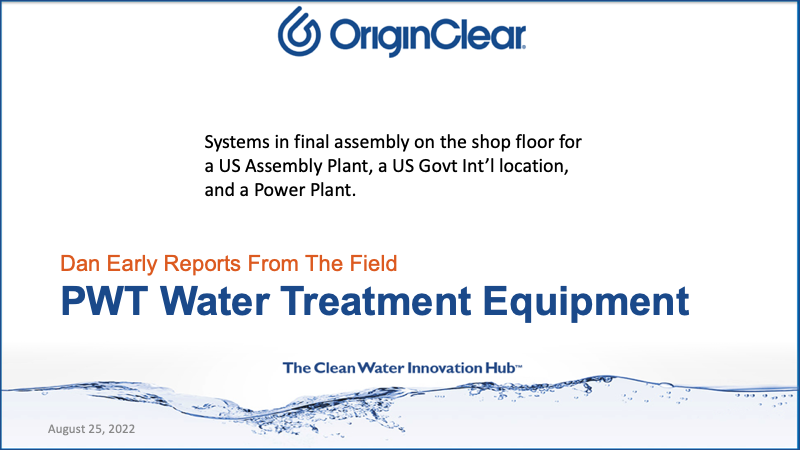
Start of video presentation
Dan: It is about 5:30 p.m. Central Time on August the 17th, 2022. And I am in the the finished assembly or final assembly area at Progressive Water Treatment, located in McKinney, Texas. And I'm going to give you a quick walk around of current progress underway of things that are in final assembly and moving towards shipment to the end user.
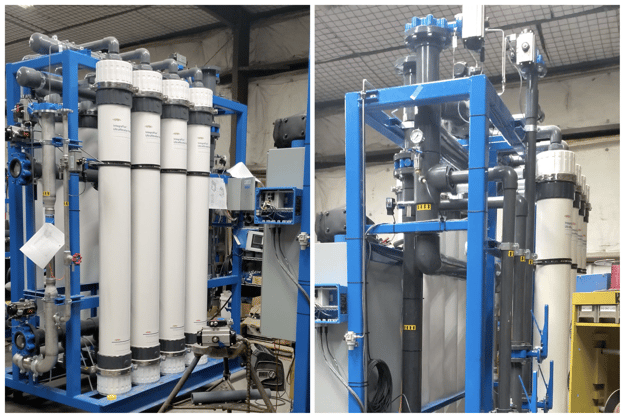
What we have here in front of us is a dual train ultra filtration module. This is a system that is being manufactured for an electric vehicle company name withheld for confidentiality reasons. But this gives you an example of the complexity of some of these systems and also gives you a glimpse into the craftsmanship and the engineering that goes into manufacturing these UF filtration modules.
This system is designed to take production wastewater, to filter it and to clean it so that they can then recycle it for secondary purposes in their facility. So very nice example of a UF system as fabricated by the technicians and the fabricators at Progressive Water Treatment.
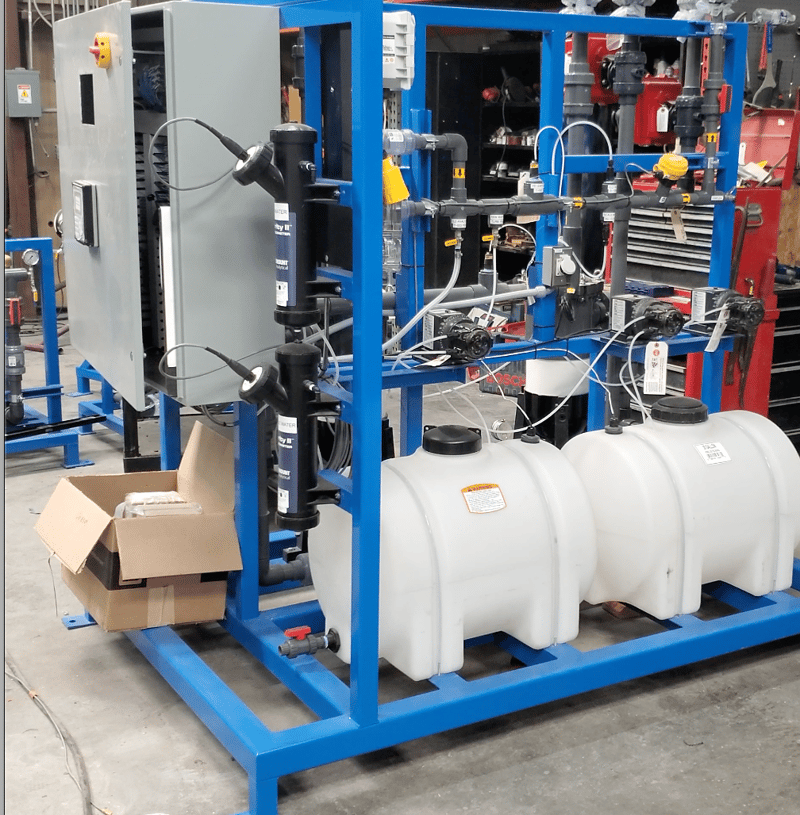
The next system. While not overly complex, is a chemical feed system in an irrigation skid for an irrigation water reuse system for a US embassy facility, Progressive Water Treatment and its sister division of Modular Water Systems™ are actively supporting and delivering both water, potable water, drinking systems and advanced wastewater recycling, reuse and reclamation systems to the US Department of State for embassy facilities overseas.
Dan: Interestingly, I'd like to make it make it known that we are actively working on about maybe 15 current embassy and consulate facilities and have serviced about ten prior to that. This is becoming a very, very good book of business for the company.
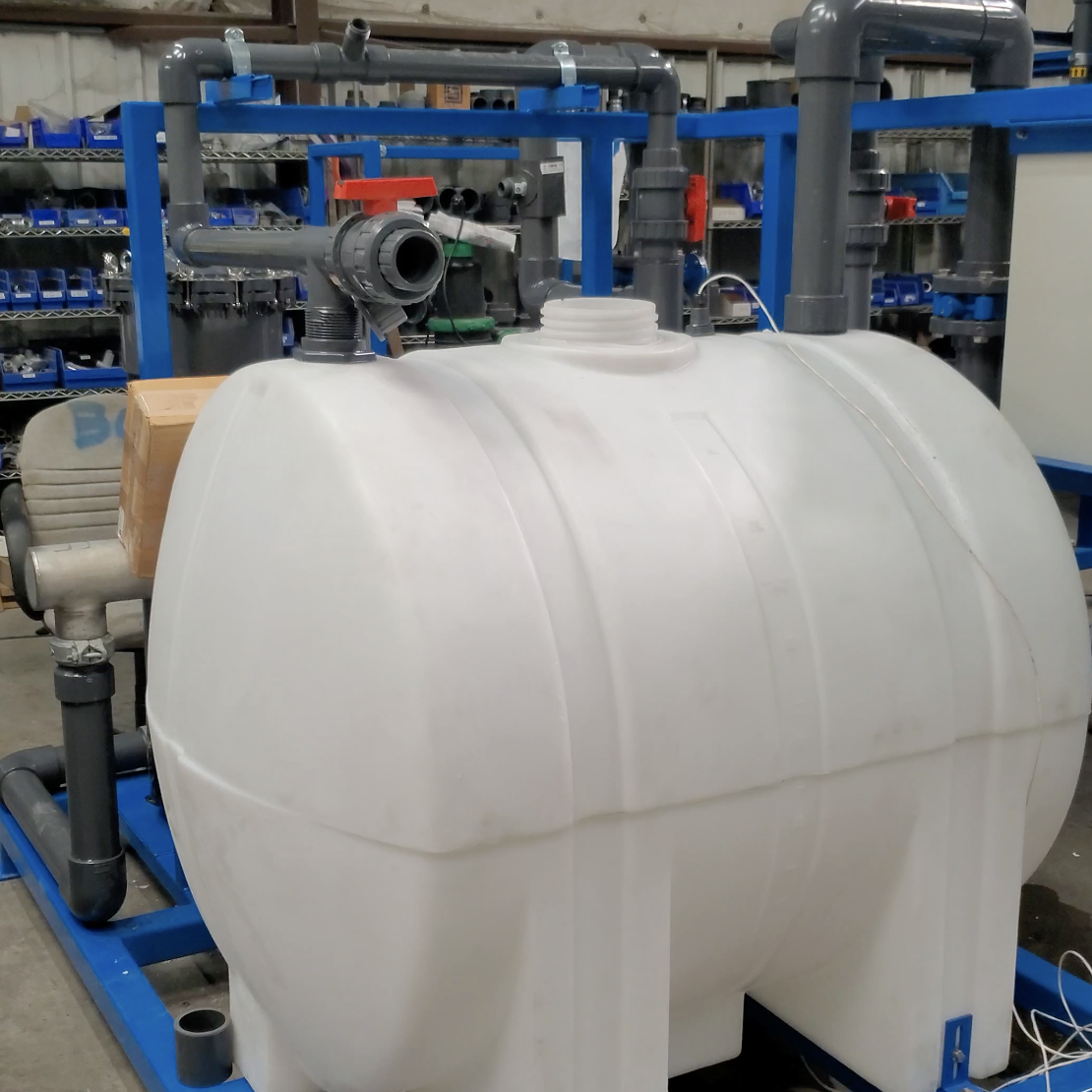
I have another chemical skid system, bulk chemical feed system for a water treatment plant.
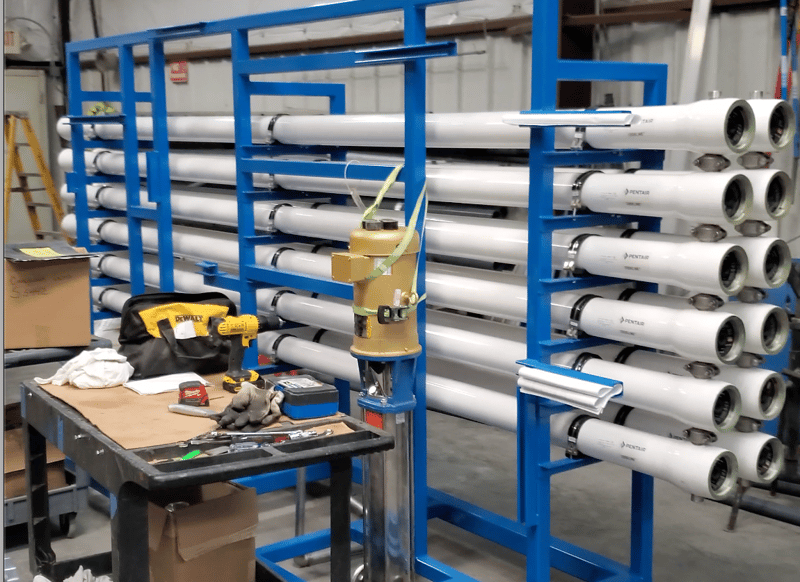
This right here is a reverse osmosis system, a dual train, dual pass RO system being fabricated for another company. So for those that don't understand, you have ultra filtration, microfiltration, nano filtration and reverse osmosis. So those are four different stages of the typical membrane filtration that you see in the water and wastewater treatment industry. So as you can see, this is an example of the things that are currently in final production and the final assembly area at Progressive Water Treatment.
End of video presentation
What We're Able To Do
Riggs: Well, obviously, he was telling you guys more than what I was telling you. One of these systems being for a electric vehicle company and there's only so many in America. So I'm not going to say more than that. Let's continue here. Here we go.
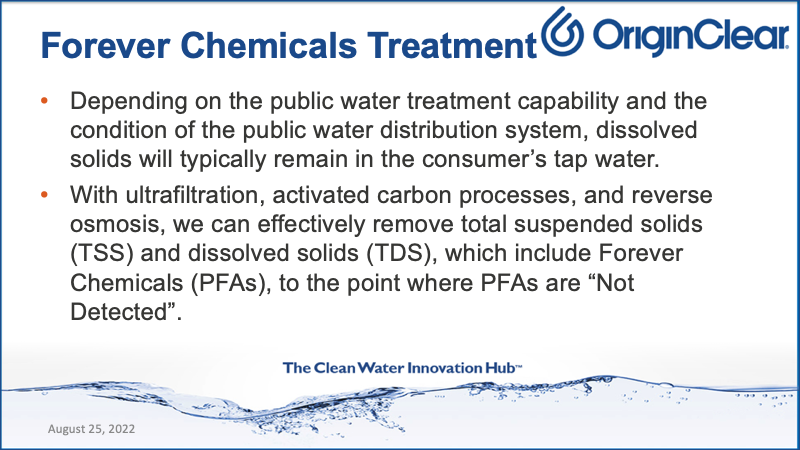
Basically, this is what we're able to do when we treat to the level that are expected from tap water, for example, there's still dissolved solids, but we actually get it all out. Ultra filtration, activated carbon processes and reverse osmosis. We can remove it all. That is basically the forever chemicals thing. And as I've been saying, this is where we are going to be putting a system into the hotel based system.
Audience Questions and Comments
So Coletta wants to know how we can get them into homes. We don't work with homes. And the reason is that's a mass market. And remember that as much as 87% of all water use is agriculture and industry. Now for the home, just go ahead. This is what we did in our home. We got for the entire home. We have a system that gets down to 0.2 microns. So it's not doesn't get rid of all the suspended solids. And then we, but then for the kitchen sink, we have a full reverse osmosis system that takes it all the way down to this level.No, no. Forever chemicals.
And also. The showerheads are a special showerhead that removes those forever chemicals, including something called glyphosate. Glyphosate, also called Roundup, is actually present in 80% of all tap water in America, and it is actually a source of brain cancer. So I have a holistic doctor. A couple of years ago he said, "Get this showerhead, so we have a shower head." Anyway, so that's the picture there.
And Coletta, thank you, "Peace King. Thanks for allowing us to be part of this." It's our pleasure. And of course, Neil and Robert and Paul, welcome here. The issue of reusing the waste for fertilizer is a good one. Remember an October 2019? One of the very last trips, in fact, the very last international trip I did before COVID. I went to Spain and we had a system where we were helping to create fertilizer and clean water from pig manure, very effective.
We, subsequently that particular vendor got, basically they ran into trouble at COVID and they were not able to restart after they were shut down. But we also decided to not be in the fundamental technology space of because what you have to do is not just remove the solids, but you have to you just remove the forever chemicals now that forever chemicals are in the solids.
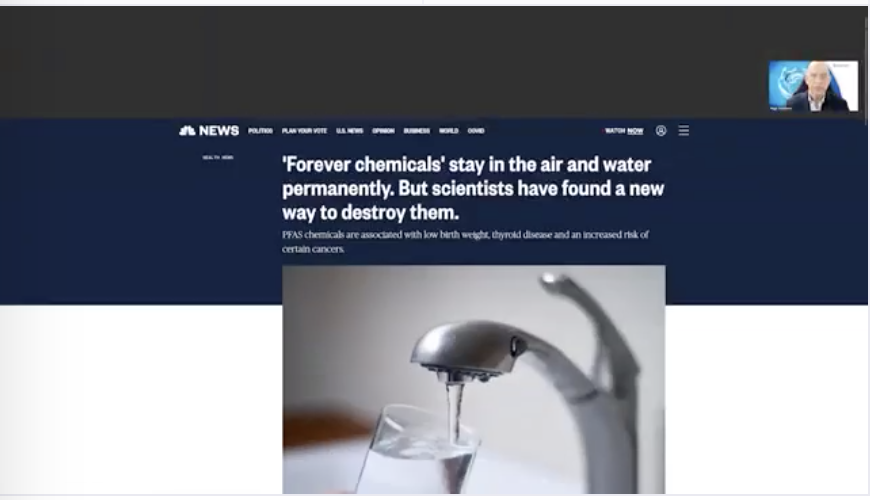
There is some information that, in fact, I can share right now with you about this. NBC News reported on this. That there's a way to remove them and it's being done with this technology using solution of lye. And basically that's a really smart concept.
So whether it's the electrolysis system that we pioneered in Spain or it's one of these, you have to do something to neutralize the chemicals in the solids, but you've got to do something about it because unfortunately, these forever chemicals, they really are forever. Most of industry has stopped using them, but they're still there and they're forever there. Unfortunately, that's the way it is.
PhilanthroInvestors Facebook Live
We had a great show earlier this week. In fact, it was yesterday and it was about almost an hour, but we went ahead and condensed it for you to the most interesting and specific parts. It's got a lot of very good information, so I'm going to go ahead and play it now and enjoy.
Start of video presentation
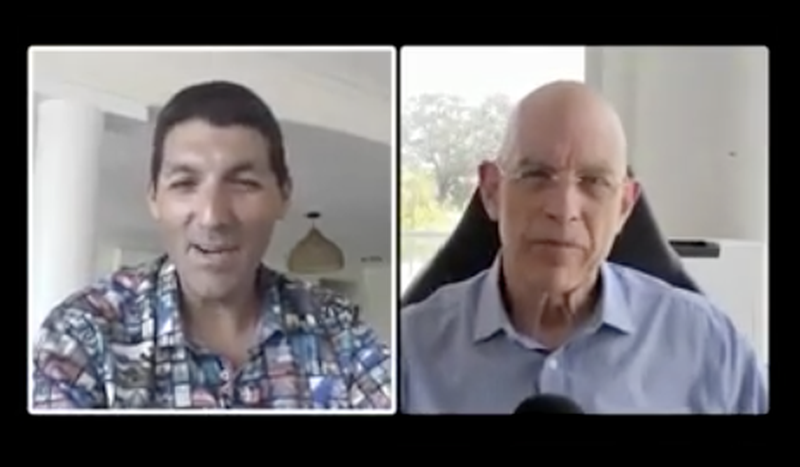
Ivan: Hello, everybody, and welcome to our first PhilanthroInvestors® fireside. I am so happy that after a few technology steps we managed to make it together. And today I have in our first live PhilanthroInvestors broadcast and not only my personal friend, but the CEO of Water PhilanthroInvesting™ company Water on Demand and OriginClear founder and a lot of years training and even managed vessels in any every single ocean. Mr. Riggs Eckelberry. Hello, Riggs.
Riggs: How are you, Ivan?
Ivan: Very good. And you?
Riggs: Fantastic. Yeah. It's a beautiful day here in Florida. And I guess you're in Puerto Rico, right?
Ivan: Yes, I am in Puerto Rico. And the weather is here also is beautiful. And there is a lot of ocean around and a lot of water that we need to take care of and make sure that improves in the condition on the planet.
Riggs: Thank you very much, Ivan. And, you know, we first got together in 2020 when you were looking to expand your PilanthroInvestors into water. Since then, water has become a perfect storm. Why? Number one, we have tremendous droughts happening in the American west, also Europe. We're seeing the Rhine River and the Danube River and also the Yangtze River in China, all running dry and and terrible problems as a result of that.
We're also seeing that all of the water we drink has something called forever chemicals in it. So that is a health problem. So even in countries where we think we have good water, we have problems. And then the third major problem is that the central infrastructure. Again, even in developed countries, is not being funded enough. And so it's more and more local survival to make your water work. And OriginClear is dedicated to helping people survive better with water.
Ivan: Yes. And that's exactly what you are saying, Riggs, is what I was researching in 2019. Many problems in the world that are happening because of not taking care of the water. And I started researching and learning 6000 kids die from water related diseases every single day. And then I started learning and learning more. 80% of the water gets released untreated in the planet and the US only recycles 1%.
Riggs: We are very in the middle of scarcity we have. We're treating it like it's abundant. The municipalities are trying their best. There's no question that we have 150,000 plus water systems in this country, and they're trying their best, but they're underfunded and they have water systems that are leaking, losing water, therefore losing revenue as much as 20, 30% of their water is actually just going into the ground. So that's a terrible problem.
And all of this is leading to skyrocketing water rates, which is harming people at the family level, but also corporate level. And so we really you're right that it's very similar, Ivan, to what you've done in Equity and Help, which is your housing PhilanthroInvestor Program, which is people who could not possibly get a home, now they can.
And we're making it possible with Water on Demand our pay per gallon program for people to survive, primarily businesses and communities survive, even in situations where they didn't think they could. And so we're really becoming something really urgent. For example, we're talking to a a group that is organizing a homeless housing development, and they want to have the water system, but they would like us to fund it and then just charge them by the gallon. Otherwise they'll have a very hard time building this housing development.
So this is becoming really a critical thing. And fortunately, this program of ours is funded by everyday investors, which is super cool, right? So unlimited capital available not from JPMorgan Capital or from Kleiner Perkins? No. From the world's investors who are the strongest force on earth.
Ivan: Yes. And that's very interesting, because something that I always think about it and share with my friends also on the PhilanthroInvestors Network is that every single person in the world use an average of 51 liters per day of water is the amount of water that the person needs. And at the same time, I did more research after we partnered together in 2020 and I learned more about the fact that we have only 20, 21 years of of good quality water, lack or no actually supply that can be for the planet like the planetary water 21 years with the supply that we have.
Do you have more information in relation to that? Because I realize that we are taking from the planet 51 liters of water every day, every person. But what are we doing as human beings to give back that 51 liters or more of water to the planet? Even with the money that we earn, because the water is giving us life and with our life we are producing money. But then we are not giving that money back to the water to produce 52 liters of quality water in the planet every day. It makes sense?
Riggs: Yes, well, there's lots of water, but the percentage that is actually drinkable is very small. And so that's where we really have to think about how are we going to be, it's like there's a tremendous supply of water is a tremendous demand, but in the middle of it is making the water drinkable. We're dealing with really outdated infrastructure that, as you pointed out, does not do any recycling. It just uses it and throws it away.
And of course, in some countries there's no treatment at all, which is why so much of our water ends up in the ocean, etc., completely like a sewer. It's really terrible. There are creative solutions, but those solutions require money. And this is the big realization that we were having in 2020. When you when you joined us, you remember very well.
We were trying to figure out what to do and we realized, "It's the money, stupid," if you can. Fund programs without waiting for the government to raise billions and trillions and all that stuff. Just action on the ground. Self help is the solution. And since then what we have seen is a tremendous amount of business and community users have come along saying we want to be self-sufficient for water.
I'm talking about housing developments, hotels that are really, really, really want to make sure that their guests don't get forever chemicals in their food, etc.. And travel stops on the highway, campgrounds, trailer parks, all these detached locations that are often off the grid. They're like, Hey, we need to have control over our water, otherwise it will be in deep trouble. But that is an indication of the need, the tremendous need for what's going on here, which is you have to increasingly make sure you're going to be okay with your water supply.
Ivan: In the world. There is many water problems in the Third World countries, but we are hearing of many water problems, even disasters like the Colorado River drying up. What what can we do about these problems Riggs?
Riggs: Okay, so let's talk a little bit about what's happening in the American West. It's terrible because California is a desert and yet we've created water intensive crops in the middle of this desert. Now, how are you going to remove it? This crops bring in $20 billion a year in revenues, and yet it should be barley, not avocados. But this is a tough decision.
So there's many, many players downstream of the big watershed in Colorado. And what's happening is the kind of pulling pushing each other. And nobody's really cooperating. This is going to be a painful process. What we can do about it is, number one, the water that we do have, let's make sure it's cleaned and recycled, get more turns, as we call it, out of the water.
When a brewery makes a liter of beer, they're using a lot more water to make that liter of beer. Now, we need, they need to be able to use that water again, even if it's only just to wash down the equipment or whatever. And that is going to make a big difference. Israel, which isn't a desert, and they understood this. They built their system after World War Two to be highly recycling intensive. Almost 90% of their water is recycled. We have a much older water system in America that is not going to be fixed.
Riggs: We're not going to make if you're in LA, the water runs from Glendale down to Santa Monica to be treated. It's not going to go back up to Glendale. It's going to go into the ocean, and that's not going to change. But if you put in a private system in Glendale to treat the water with on the meter, just like as if you're paying the city, then you're able to reuse it. And then the city is grateful because they don't have to treat that water.
It's a win win for everybody and it enables true access for everyone to water. So recycling is key and treating all that water is also key. We we've got to stop being so wasteful. There is plentiful rain in Mississippi, for example. So, yeah, "Well, we don't have to recycle. We're okay. We're good."
Well, no, actually, you should be treating the water and charging the groundwater, recharging the aquifers, because otherwise it's going to end up to a point where it could take 600 years to recharge that aquifer. It goes away forever. Now people talk about, "Well, we'll just use desalination." Problem with desalination, it's just very energy intensive and we have an energy problem. So you start playing those games...
Riggs: There are some really good creative solutions, but the beginning, it all starts, as you say, with taking care of the water that we do have, making sure we clean it and making sure we recycle it. And OriginClear is here to fund that through our program called Water on Demand. Water on Demand enables a business or community to just say, okay, I'm going to sign a document and automatically I'm going to get a system, show up, fully maintain I pay by the usage. And I don't have to come up with capital and so forth.
And it's funded by America's investors who then get a return on their investment and everybody's happy. So that's a very solid approach that we're actually planning to expand out to other countries. You're going to be touring South America soon, and that's going to be very, very interesting because South America has big water challenges. We know that.
And again, they should be fine because there's lots of rain and in South America, but there's a problem with managing the water. So we just got to become much better at it and. By helping with the capital coming from America's investors. That's where OriginClear can become a key player. Just as your own housing PhilsanthroInvestors becoming a key player for people who can't get it otherwise.
Ivan: There is a great concern, deal of concern about forever chemicals. And how is OriginClear with your own vision, which I call it amazing, helping?
Riggs: Our chief engineer, Dan Early. He's showing us a system that combines ultra filtration. Reverse osmosis and nano filtration, that triple combination. There's nothing gets past it, it's clean. So we're routinely delivering that. We know how to do it, and we're doing it for businesses. It's no secret that we have a project with a hotel that we can't yet say which one, but they're about to launch it publicly that treats all the water going into the hotel without any forever chemicals.
And that chain has made an internal decision like, you know what, we've got to get ahead of this problem. We have to be able to tell our guests the water you drink, the water that goes into making the spaghetti that at the restaurant, all of it is going to be free of forever chemicals. They want to be leaders and OriginClear is working with those leaders. I feel quite sure it's going to be eventually quite common.
Now we don't work at the level of the home because that's a mass market where we really think the most change can occur is at the level of businesses and communities. Remember that more than 80% of all water use is by industry and agriculture, right? So that's where the real change can happen. And we are delivering those standards every single day. I love that we're doing this because people need to be sheltered from these toxins.
Ivan: Tell me a little bit more. How can I connect? Like, because I invest in gold, I invest in real estate, I invest in, I have car dealerships. When my families are in bay, invest in cars. How does it work that this amazing life business is an asset or can be an asset?
Riggs: Well, isn't it ironic that the most important commodity out there, which is water, is actually not considered an asset for commodity investing purposes, right? And why is that? It's because we let the government take care of it. The government takes care of the water and I open the faucet, the water comes, I flush the toilet, the water goes away, everything's fine. And so it's never developed itself as an actual real market. And that's bad because these days we can't rely on the government anymore.
Why? It's not because government is bad, is it because we've learned that the government can't take care of all of us. It's just not able to do it. It will never do it. For example, if I want to double the water treatment capacity in this county, where do I put the facility? It's all built up. And where do I find that $10-20 Billion to do it?
So at this point, we have to think of how do we make water an investable asset so that it is propelled by the world's investors who number in the millions, small and large. And with that, all of a sudden it becomes something you know, there's a good, good saying is what you push, you get, right? So if you push water investment, you get water investment and therefore good projects can be funded.
Riggs: So I really think that it's been a, that we have a transition going on where water is coming out of government. It's still you still have a right to water. People think they were saying, oh, no, you know, we're like Nestle, we're going to take the water and bottle it and take away from you. No, no, no, no, no. We're treating the water that you're supposed to have and we're just making sure that it's clean, that it's available, that there's lots of it, that there's no forever chemicals so that you can use it.
And that makes it an asset that pure water becomes an asset. And then we've securitized it. We've created a security around it that then generates income for the investor and funds these things for the user. And I think that's an essential step. And there's we're not the only people in the water industry doing these pay per gallon programs, but we're the only ones doing it with access by the regular investor. That's the big difference. And I think that's huge.
Ivan: That's amazing Riggs. Well, I only have to say thank you for your time for being with us and for the last two years of our relation and and for continued trusting in PhilanthropyInvestors for the future. And, you know, as you always tell me, let's break a leg.
Riggs: Break a leg. Right on. Well, let's do that. And I wanted to thank you especially for your amazing support. I know that you have been talking about us a lot. Your personal commitment is huge. So thank you to you and your whole team.
Ivan: Thank you, Riggs. And thank you, friends for joining us. And let's have a wonderful rest of the week and an amazing weekend. Thank you Riggs. Buy, my friend.
Riggs: Take care.
End of video presentation
About PhilanthroInvestors
Riggs: That's a an excerpt. You can go to the Ivan Anz Facebook page and you can watch the entire thing. Very, very interesting. But those are the highlights. And it's clear that our mission is so crystallized and PghilanthroInvestors has been an amazing amplifier of our message because, frankly, they have international footprint. We don't. And so they're able to go well beyond what we have.
And they have been super, from day one they're like, "We get it!" They got it day one. You know, Ivan was looking for a water company that he could get behind because he was trying to having done real estate very successfully. Inc 500. Okay. Now, what about water?
And in fact, he told us that he had a bad experience with one water company. It didn't work out and then run in. It's an interesting story that he actually ran into me in a CEO briefing just like this one. And then he told his his CEO, Arte Maren, hey, there's this guy Riggs, who's got a company and he goes, I know Riggs. It turns out that we've known each other for many, many years, really kind of kind of a funny story.
But the point is, is that he got it already. Got it. The whole team there. Got it. Wendy, George, the whole whole gang, they just they just have it together. So they are amazing and we're truly grateful for them. Okay, let's see what else we've got going on here. All right.
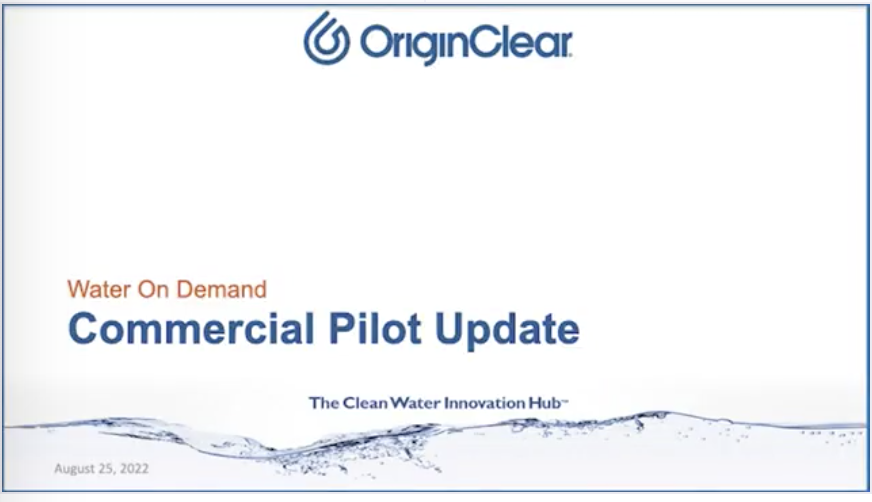
So there's a quick update on the commercial pilot. This I was supposed to play this last week, but I ran out of time and just a little bit of time to play this. And I'm actually going to add some additional comments of what's updated literally as of today. Okay. Here we go.
Start of video presentation
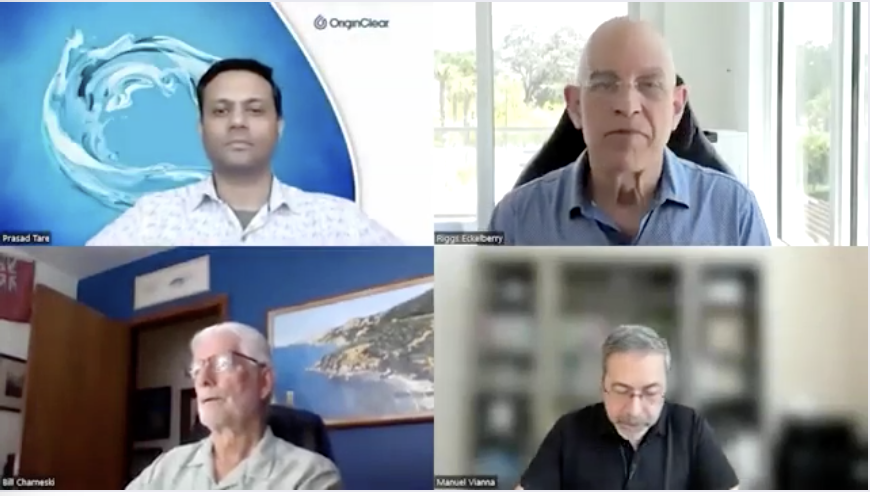
Manuel: All right. So several several things to update the team on. One is a proposal that we sent out for engineering services, which for a large customer in Texas with several locations, together with our partners at Envirogen® Technologies, we have sent the proposal of our side of it to Envirogen. They have accepted it as is.
I got good help from Mark Mazochette preparing that and from guidance from Tom. So that's being incorporated now into a proposal that Envirogen is going to send forth to their customer. And as I as just to refresh your memory, this is an engineering services basically to do an audit of their multi site installation and propose a broader, more comprehensive solution.
So we hope that this will turn into a multi site DBOO (Design, Build, Own, Operate) type opportunity. So we should hear something about this within, you know, maybe a couple of weeks from the customer. I think Envirogen is planning to forward this to the customer by this week. So that's one update and it's successful so far it's it's on the right track.
Second update, our friends at PhilanthroInvestors referred this to one of their investors who is actually leading a large residential development project in Utah, about 1500 acres, up to 6000 residential units. They are looking for a solution for the water side of the project. I've gotten with Dan and Mark. We've had a meeting about it and we should have a call with this gentleman today. Still to be confirmed, it should be in a few hours.
We are confident we can tackle the project will be a very, very large project for us typically. But you know, Dan has figured out an elegant technical solution using our Modular Water Systems. And what we are lacking is, quite frankly, the engineering manpower to be able to pull it off in the deadlines that the client has indicated.
So this is not a speculative wish list type project. You know, they are funded. They are in final due diligence on the, on the land. So this is and they have a budget for the whole project, approved and funded and including for the water part. So we, I think we would struggle according to Dan and Mark, we would struggle a little bit on having enough available engineering capacity to tackle the project.
I've done some preliminary inquiries with our partners at Environment Technologies. They probably could supply that specialized labor to help fulfill our project. So we are trying to go the next step in this conversation with a customer and see if it's really viable and if the economics clear and all that kind of good stuff. But it's it's progress there, you know. So that's second.
The third commercial update is with our friends in Puebla, Mexico, a jeans washing plant that has difficulty. They've been forbidden by the regulators that they can't discharge into the public sewer system. And they currently have all their waste water trucked away to a central plant. And our friends in Mexico are checking with us whether we can handle that at the point of a decentralized way, at the point of discharge. And this factory and it is something that if we could do, would be very good.
Also, as a pilot for many other locations in Mexico, as you may know, there's tremendous pollution problem around Puebla, this central plant, which is a private concession for another 30 years. Plus they can't do it economic economically. They can serve a radius of something like 15 miles around, but they don't venture much further out. If we create this pilot with them successfully, then it becomes a solution that can be adopted much more widely. So that would be interesting expansion opportunity.
I've been working with the engineering staff again with Dan and and Mark. They have, they have already done a preliminary sketch of what our technical approach would be. They're refining. We just got some more data recently, the last few days and over the weekend about the chemical analysis of the effluent of the plant so that we can actually be a bit more precise about our what our design would be, our technical specifications. And so that I can actually we can come up with some preliminary pricing. So but that's we're making progress there.
And I understand Riggs, that you've you've talked with this gentleman in Mexico probably yesterday as well. So I don't know if you have any news there on that other side of the conversation, but I think we'll be ready to get to him about this particular project in Puebla within a few days, two or three days, something like that. So that's been busy.
And I think that the connection that Tom made for, for me with the folks in the engineering is working well. I'm getting good support and that just makes it more faster response time to these these serious leads. We also have a lot of other leads that don't seem as serious, and I've been busy triaging those things. So we have a fair level of activity going on. And more most importantly, three things that look promising to the opportunities that would be, each of them, significant and boding well for future further business development. I don't know if anybody has questions or areas that you'd like to discuss, but that's the quick update.
End of video presentation
Additional WOD Project Info
Riggs: I don't know about you, but I was tremendously distracted by this guy, Riggs, constantly multitasking during that meeting. It's like, what is this guy doing to summarize it? We have adequate capital to go ahead and do several projects. Now, what we're in here now is this typical water industry process where we're going to check things out and engineering and so forth.
We actually have a very good team on it. Mark Mazochette, who now works for Dan Early, is extremely detail oriented, very professional engineer. He recently joined Modular Water Systems and he's being very responsive so that Mexico project is moving along quickly.
Also, we have the latest update literally from today is that we are hoping to get a housing development project done in the Dallas area and that may actually happen sooner rather than later because we have to get it, we have to get people who themselves are like are on fire. Right. Because again, the one industry is typically not on fire. So how do we sort of get this thing going?
We think this particular partner is going to be very responsive. And I need essentially I need to be able to work with a partner who's going to move as fast as we are because we got this these funds, we want to start generating royalties. It's very, very important. I believe it's going to happen. We've found the right partner.
So what's coming up soon? As I say, the first Water on Demand project, I believe I'm going to be able to put together a partnership with this, don't get into specifics because I don't want to get out over my skis, as they say. Secondly, there is the upcoming launch of the of that hotel that I keep talking about. It's been going on forever, but the system is in place, working fine, everything's great.
And now we're just organizing the actual launch activities. We've done all the marketing work and as I was saying, we have the second hotel already being set up to go as well. So that's moving along fast. I hope to be able to announce that as well. Okay.
Audience Questions and Comments
Now, let me just there's been a lot of comments here. Michael Hardison, "Want to know what's up with the Pondster™? So remember, this was that very important pilot of this new technology using a nano ceramic and. What's happened is that continues to be its own pilot. We are continuing to install. We've got a second mobile home park. You saw one of the units being toured in that video today. That's going to a mobile home park, but it's using conventional reverse osmosis and ultra filtration type technology.
So we've got a parallel path here. It's always slower with new technology. So there's one site. Great people, wonderful people. SunTrace Mobile Home Park in Troy, Alabama, very, very supportive. They're working with us closely. And the the opportunity there is to spend much less on the project than the conventional way that continues to be worked on. It's making progress, but that hasn't stopped us from using conventional methods to keep going with the mobile home parks. That's where that stands.
Steven Davis says, "I'm in Utah. Let me know if I can help with the residential project proposed in my state." Very good. We will hook you up if you would send an email to invest@originclear.com. We will hook you up with the partner, which is Ivan actually is working on this. He's not directly working on it, but he turned us on to the gentleman who's who who is doing the project. And so we'd love to have your help, so thank you for that.
Okay, so lots of good projects going there. I hope it wasn't too dry. I hope you weren't too distracted by this guy Riggs doing 12 different things during the project. Ivan says that he will be in Utah in November, so maybe that can be pulled together. With that, I'm going to move into the freewheeling discussion. Da da da. Mr. Ken Berenger.
Freewheeling Discussion
Ken: A very brief, freewheeling discussion. We've had so much got so much information going in there that so I in responding to the comment so it's so funny we've been doing this now for four years. CEO briefings, right?
Riggs: Yeah, really.
Was Planning, Now Doing
Ken: When we first did it, back when people did these on telephone, we did them on telephones for like a year, year and a half. And now we have this great Zoom technology. But we were talking about, all of the things that we wanted to do. Now we're talking about all this stuff we're doing. The evolution that we've gone through as a business and as a company is absolutely astonishing.
I just look at, I go in the Wayback Machine and I look at these old videos of us, and it's just like we have these. The messaging has been identical for years. We're going to do this. But it was kind of like we're figuring out how, now we have more business than we can stand.
Clean Water is Scarce
Someone mentioned about water that you talked about with Ivan about as an investable asset. Here's something that kind of came to me in a minute. Water is one of the most ubiquitous elements on earth, right? I mean, two thirds of our planet. But clean water is astonishing, astonishingly rare. In fact, the water that is brought to the state that you described in the hotel, the mic.. the ultra filtered, I believe that you used a term it was mic, there was a micron down to two microns.
Riggs: 0.2.
Ken: 0.2 Microns. So water brought to that state free of PFA, PFAs. Right now, water in that, a gallon of water in that state on this planet is rarer than platinum. I would say in many ways also the fact that it keeps us all alive. So when you think about, we can create water in a state that is rarer than some of the most precious elements on earth. That's exciting.
Riggs: Well, the .2 Micron actually is that's too that's too big. So that's what we installed, we made a decision to not treat the forever chemicals that went into just regular water use. But, you know, the cooking water, the drinking water that is zero zero microns, nothing. Zero zero.
Ken: Right. And water in that state in this world right now as it stands, is that doesn't exist. There is no water that's in that state. Naturally, we've.
Riggs: We've screwed the pooch because the rainwater has the glyphosate, etc..
Ken: Right.
Riggs: I'm going to be wrapping it up because we've managed to use up our time again. But there's there's been a debate going on in chat about reject water. Now, when you do reverse osmosis, which, which means you're squeezing water through a screen basically with a lot of pressure, you're left with 25 to 50% of it is waste. And where does that go now?
There are ways to then reuse it, reprocess it, do all kinds of things to it. Here's the rub. Many customers are not willing to pay for the additional steps. So we have the technology. Remember that we do what the customer is willing to pay for sure. Reverse osmosis yields very, very pure water, but the reject water typically has more brine, more solids, etc. When you try to reuse it, it's more expensive because it's more dirty and it's kind of like a...
Ken: It's a purer example of the dirty.
Riggs: Exactly. Concentrated dirty.
Ken: Dirty. Right.
Riggs: So, so part of it is there's going to have to be more and more awareness of the need for saving. In California, they have a big awareness. In Mississippi, less so. So that's kind of how it is. All right. Well, it's 9:00 PM, and I really wanted to thank you all for coming on board. And it's been amazing to have you guys and gals stick around so muc, so long. I know that the water industry stuff is like, what the heck is kind of dry? But this is the the assetizing of water, taking it from government and pulling it out and then monetizing its treatment, which helps government because it reduces the load and it permits recycling.
Ken: Addressing Coletta's thing. Creating more clean, pure water makes it less rare, makes it less like chasing the world, chasing after the same few gallons of clean water. There's this. There's a saying, Macron said today that the age of abundance is over. Abundance creates peace. Right? Shortages create strife. What we're going to try to create is an abundance of clean water.
Riggs: And by the way, it is not the end of abundance. That's a that's a myth.
Ken: Oh I agree. I didn't say he was right, I just said he said it.
Riggs: Technology and invention can solve problems that regulation cannot. But that's a story for another day. I want to thank everyone. Stevan Davis says, "Thanks for great session." Robert Baxter, "Great job, guys." Thank you, everyone, for being on board. It's been a great show. I will get into many more. I've been piling up all this geopolitical things about inflation and so forth, so I just can't get it out of them. I promise you I will.
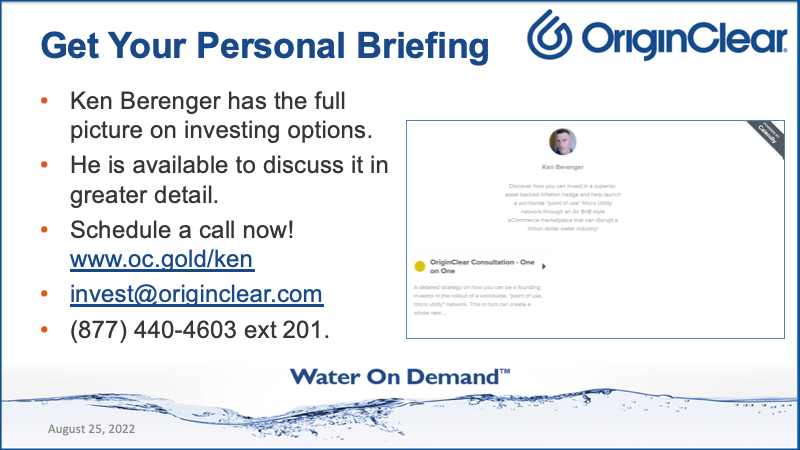
Just Call Ken!
Ken: We didn't do the oc.gold/ken.
Riggs: Ken and I will do that page right now. Here it is.
Ken: And are we going to talk about what we're changing or we're going to wait till next week?
Riggs: Yeah. So we have we're out of time, but the investing offer is going to be shortened so we can't get into it. Talk to Ken because things are, we're reducing the leverage, we're reducing the scope and it's all happening very soon.
Ken: Radically reducing the size.
Riggs: Amen. So talk to Ken. oc.gold/ken gets you in touch. Thank you very much, everyone. Enjoy your weekend. Thank you to Ivan for a wonderful interview and we'll be continuing that and peace. Kindness, joy, love and happiness, as they used to say. Take care and good night.
Ken: All right. Good night.
Register for the next Insider Briefing: HERE
%20250px.png?width=250&height=53&name=OriginClear%20Logo%202019%20(RGB)%20250px.png)




